From: Ishwar Sharan
Sonia Gandhi and the return of Maut Ka Saudagar – N.S. Rajaram
 "If anyone deserved to be called maut ka saudagar – merchant of death — it was Leopold, King of the Belgians whose knighthood Sonia Gandhi feels proud to possess. If Sonia Gandhi, a European of humble origins, feels honored to be admitted to an order that carries the name of this mass murderer because he was a European prince it is her prerogative. But she should have done so in her own capacity as Antonia Maino and not drag the name Gandhi into it." – Dr. N.S. Rajaram
"If anyone deserved to be called maut ka saudagar – merchant of death — it was Leopold, King of the Belgians whose knighthood Sonia Gandhi feels proud to possess. If Sonia Gandhi, a European of humble origins, feels honored to be admitted to an order that carries the name of this mass murderer because he was a European prince it is her prerogative. But she should have done so in her own capacity as Antonia Maino and not drag the name Gandhi into it." – Dr. N.S. Rajaram
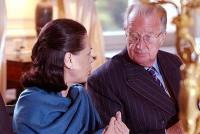 Perhaps unnerved by Rahul Gandhi's fiasco of a speech at the CII, and the simultaneous rise of Narendra Modi, the Congress is increasingly resorting to personal attacks. Recently, it has revived the old phrase maut ka saudagar – merchant of death – used by Sonia Gandhi several years ago. (Sonia G. is not literate enough in Urdu to come up with the phrase, it was the creation of the lyricist Javed Akhtar, Shabana Azmi's husband.)
Perhaps unnerved by Rahul Gandhi's fiasco of a speech at the CII, and the simultaneous rise of Narendra Modi, the Congress is increasingly resorting to personal attacks. Recently, it has revived the old phrase maut ka saudagar – merchant of death – used by Sonia Gandhi several years ago. (Sonia G. is not literate enough in Urdu to come up with the phrase, it was the creation of the lyricist Javed Akhtar, Shabana Azmi's husband.)
This is to be expected, for after all elections are only a year away and Narendra Modi is emerging as the greatest threat to continued dynastic rule of the country. Since they have resorted to personal attack, let us see how lily-white (no pun intended) the accusers have been.
Sixty years after Mahatma Gandhi fell to an assassin's bullet, the most illustrious bearer of the Gandhi name today accepted the Order of Leopold, instituted by the Belgian royal family. The name Leopold, King of the Belgians is synonymous with the worst excesses of European exploitation of Africa. Leopold, the king whose name the award carries was a slave merchant who rivals Hitler as a mass murderer. (See picture.)
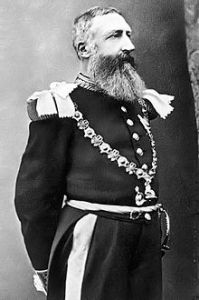 Much of the controversy when the story broke focused on the violation of Indian law by a high official — Sonia Gandhi — accepting an award that requires swearing allegiance to a foreign power. It is a legal technicality that ignores the moral dimension. Her acceptance was a sordid and ignoble act that smacks of servility and utter callousness to human suffering. (For the record, though founded by Leopold I, it was appropriated by Leopold II in 1908 by integrating it with his own order of the Congo Free State, which was the victim of his atrocities, more of which later. So, its 'honoree' carries the taint the more infamous son.)
Much of the controversy when the story broke focused on the violation of Indian law by a high official — Sonia Gandhi — accepting an award that requires swearing allegiance to a foreign power. It is a legal technicality that ignores the moral dimension. Her acceptance was a sordid and ignoble act that smacks of servility and utter callousness to human suffering. (For the record, though founded by Leopold I, it was appropriated by Leopold II in 1908 by integrating it with his own order of the Congo Free State, which was the victim of his atrocities, more of which later. So, its 'honoree' carries the taint the more infamous son.)
The name 'Congo Free State' is one of the great ironies of history, for Belgian Congo under King Leopold was a massive slave colony that was ruthlessly exploited for its rubber and ivory. According to a BBC report by Mark Dummet:
"Of the Europeans who scrambled for control of Africa at the end of the 19th century, Belgium's King Leopold II left arguably the largest and the most horrid legacy of all." Leopold claimed he was taking over the Congo Free State to civilize the natives by bringing Christianity and Western capitalism to Africa. In the process "he turned his `Congo Free State' into a massive [slave] labour camp, made a fortune for himself from the harvest of its wild rubber, and contributed in a large way to death of perhaps 10 million innocent people."
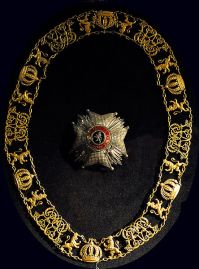 Leopold's plan was to harvest as much natural rubber as possible from the forests before organized cultivation of rubber could break his monopoly. He was interested also in looting the ivory gathered by African tribes. His government created a force called Force Publique to terrorize and plunder the African natives into surrendering everything they possessed and provide also slave labor for harvesting wild rubber. Dummet quotes an eyewitness report:
Leopold's plan was to harvest as much natural rubber as possible from the forests before organized cultivation of rubber could break his monopoly. He was interested also in looting the ivory gathered by African tribes. His government created a force called Force Publique to terrorize and plunder the African natives into surrendering everything they possessed and provide also slave labor for harvesting wild rubber. Dummet quotes an eyewitness report:
"One officer['s] method. was to arrive in canoes at a village; the soldiers were then landed, and commenced looting, taking all the chickens, grain etc, out of the houses; after this they attacked the natives until able to seize their women; these women were kept as hostages until the chief of the district brought in the required number of kilograms of rubber. The rubber having been brought, the women were sold back to their owners for a couple of goats apiece, and so he continued from village to village until the requisite amount of rubber had been collected.
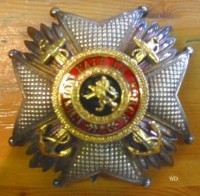 Companies operating in the Congo used prison stockades to keep hostages. If the men in the village resisted the demands for rubber it meant the death of their wife, child or chief. The Force Publique supplied military might under contract and each company had its own mercenaries.
Companies operating in the Congo used prison stockades to keep hostages. If the men in the village resisted the demands for rubber it meant the death of their wife, child or chief. The Force Publique supplied military might under contract and each company had its own mercenaries.
Adam Hochschild in his book King Leopold's Ghost: A story of greed, terror and heroism in colonial Africa quotes the Governor of the Equatorial district of the Congo Free State when the demand for rubber became ferocious: "As soon as it was a question of rubber, I wrote to the government, 'To gather rubber in the district. one must cut off hands, noses and ears.'" The victims were often teenagers or even younger who were 'punished' in this manner for not meeting the quotas assigned to them.
Hochschild also notes: "During expeditions, Force Publique soldiers were instructed to bring back a hand or head for each bullet fired, to make sure that none had been wasted or hidden for use in rebellions. A soldier with the chilling title `keeper of hands' accompanied each expedition." Sometimes the soldiers saved bullets for their personal use like hunting by amputating the victims to meet their quota.
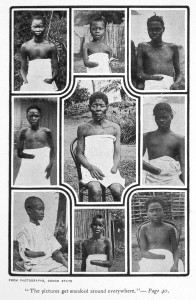 Honor from the greatest maut ka sudagar
Honor from the greatest maut ka sudagar
Unlike most in kingdoms where the king is expected follow the law, there were no rules in Congo because Leopold was the founder and sole owner of the Congo Free State, a private project undertaken on his own behalf. At the Berlin Conference of 1884–1885, the colonial nations of Europe committed the Congo Free State to improving the lives of the native inhabitants. From the beginning, however, Leopold essentially ignored these conditions and ran the Congo using a mercenary force for his personal gain.
Leopold extracted a fortune from the Congo, initially by the collection of ivory, and after a rise in the price of rubber in the 1890s, by forcing the population to collect sap from rubber plants. Villages were required to meet quotas on rubber collections, and individuals' hands were cut off if they didn't meet the requirements. His regime was responsible for the death of an estimated 2 to 15 million Congolese. This became one of the most infamous international scandals of the early 20th century, and Leopold was ultimately forced to relinquish control of it to the Belgian government. In effect, in a single African country (Congo) Leopold killed twice as many not for ideological or religious regions, but purely for profit?
Why is this unknown to or ignored by the Indian media or the intelligentsia while the Jewish Holocaust in Europe is quite properly held up as among the most infamous acts in history? Is it because the victims in Africa were black while the European victims (Jews and non-Jews) were white?
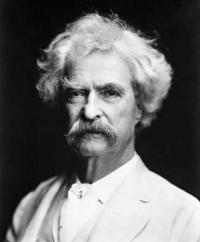 These atrocities did not escape notice at the time. In the early 1900s itself a campaign to examine Leopold's regime, led by British diplomat Roger Casement and former shipping clerk E. D. Morel under the auspices of the Congo Reform Association, became the first mass human rights movement. American writer Mark Twain wrote a stinging political satire entitled King Leopold's Soliloquy, in which the King argues that the benefits of bringing Christianity to the country outweighs a little starvation.
These atrocities did not escape notice at the time. In the early 1900s itself a campaign to examine Leopold's regime, led by British diplomat Roger Casement and former shipping clerk E. D. Morel under the auspices of the Congo Reform Association, became the first mass human rights movement. American writer Mark Twain wrote a stinging political satire entitled King Leopold's Soliloquy, in which the King argues that the benefits of bringing Christianity to the country outweighs a little starvation.
All this was known for over a century when Sonia Gandhi accepted the knighthood. So if anyone deserved to be called maut ka sudagar – merchant of death — it was Leopold, King of the Belgians whose knighthood Sonia Gandhi feels proud to possess. If Sonia Gandhi, a European of humble origins, feels honored to be admitted to an order that carries the name of this mass murderer because he was a European prince it is her prerogative. But she should have done so in her own capacity as Antonia Maino and not drag the name Gandhi into it.
Above all, having received knighthood carrying the name of the worst mass murderer in history she and her party shouldn't call Narendra Modi or anyone else names like maut ka saudagar. One who lives in a glass house shouldn't throw stones at others. – Folks, 7 April 2013
» Dr. N.S. Rajaram is Contributing Editor of Folks Magazine.
Nsala, of the district of Wala, Congo, looking at the severed hand and foot of his five-year old daughter, Boali, who was killed and allegedly cannibalized by the members of Anglo-Belgian India Rubber Company (aka Abir Congo Company) militia for 'stealing' rubber sap from the forest (1904).
Related news reports
- Maut ka Saudagar to Yamraj: Cong lacks ideas to tackle Modi
- Sonia's 'maut ka saudagar' remark was aimed at Gujarat CM: Congress
sent from samsung galaxy note, so please excuse brevity
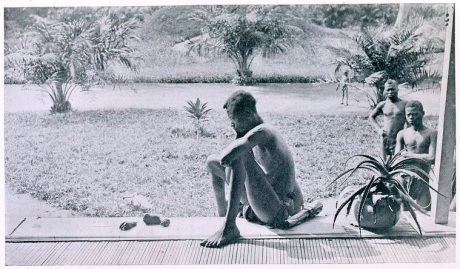
No comments:
Post a Comment